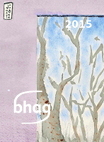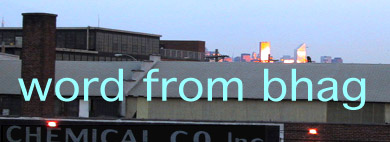b h a g . n e t visual and conceptual exchange b h a g . n e t


bhag cover page Return to current word from bhag
November 2006
TOWARD THE MIRROR
by John Clay, editor-in-chief
One recent night in Manhattan's East Village, I attended a writers group which is directed by a good friend of mine. Each of us in the small group of five persons read some of our writing aloud to the others, for reaction and commentary. It's a great way to discover, on the spot, how confident you really feel about a piece. And writing, like any kind of work or art, generally comes out better when you account for the reactions of other minds before you set down your tools the last time and say: Done!
The writer of course still always has the last say, because people's reactions to one's work will be as varied as their lives. With a mass of varied feedback, some of it contradictory, there is no choice but for the writer to decide whether, where, and how to incorporate it into the final draft. Feedback is never—to the mind of a thinking person—a set of instructions. It is, rather, more material to work with as you pound out a better final piece.
My friend Mark, who directs the group, was the last to read. Having just finished the final chapter of a novel, he read the whole chapter to us. It was long, but his language so innocently and industriously weaves sense and nonsense through one's ears, so inexorably dresses the listener in a big ridiculous coat of words as it deftly nudges one toward the mirror, that I had no hope of pausing to regain my composure, never mind dignity, as I laughed through the thirty-minute reading. I was dizzy by the end of it. I felt drunk. He was delighted. But the thing is, the other three writers—whose own very different readings I had also enjoyed—sat serious and thoughtful throughout Mark's reading. The very same expanse of time, in the very same room, with the very same words in their ears.
Mark will make his own decisions as he ponders our feedback and keys in the final words and semicolons. But to my mind, the disjunct reaction within this small group of listeners was keyed exactly to the groove of his novel. We became the very characters he wrote. I would change nothing.
© 2006 John Clay
Return to current word from bhag